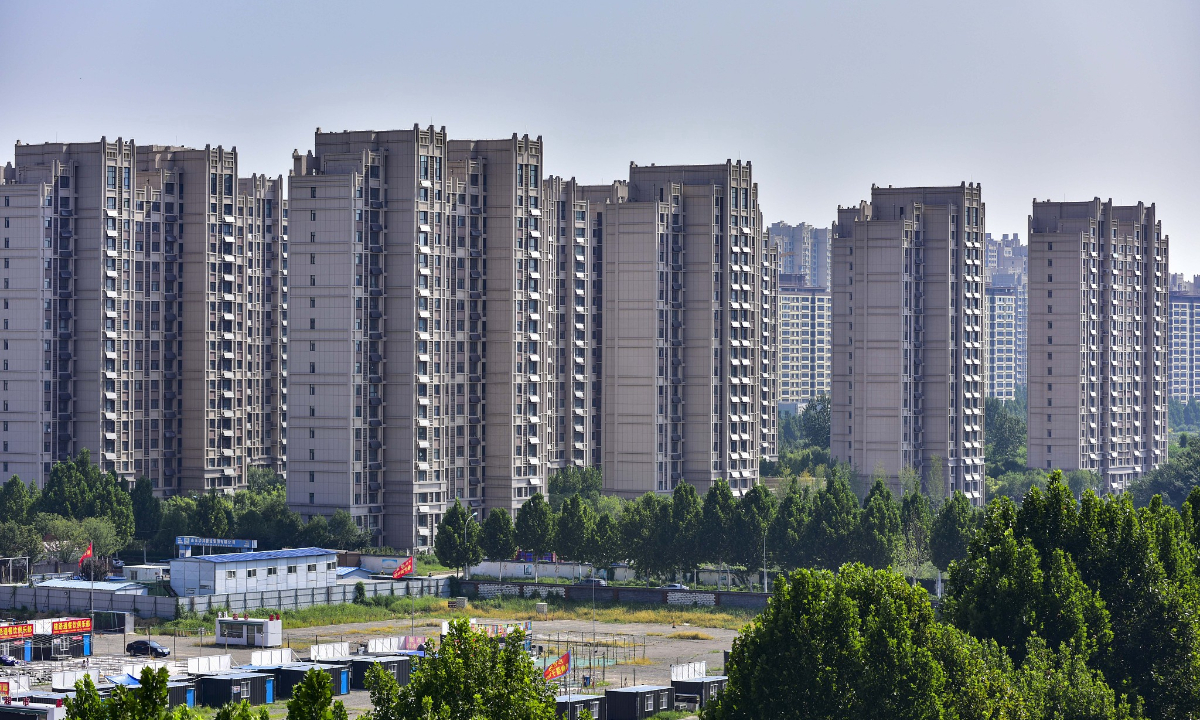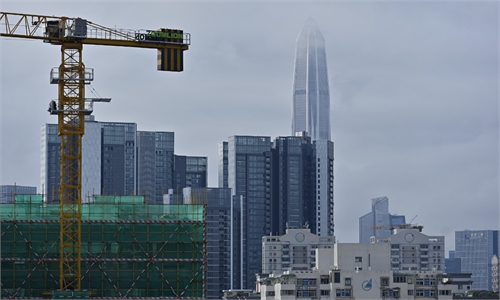China eases mortgage policies to support property market, underscores ample tools at disposal

Photo:VCG
Chinese authorities on Friday proposed a further easing of mortgage policies to support the real estate market. It marked the first nationwide relaxing of housing credit policy after a tone-setting top meeting in late July and the recent State Council executive meeting, which some industry insiders predict will produce an "immediate effect" on the industry that accounts for around 7 percent of the country's GDP.
Observers said the measure, adding to a flurry of targeted stimulus moves released in recent days, is a "timely boost" to spur and consolidate market confidence, as the recovery of the world's second-largest economy is confronted with increasing pressure, including a property slowdown.
The slew of concrete steps underscores that the Chinese authorities have rich policy toolkits at their disposal, allowing them to act swiftly to tackle emerging headwinds in a systematic way, analysts said.
Implementation of policy also offers a strong testimony pushing back against claims on bleak outlooks on the Chinese economy, some of which based their bearish views on either alleged "property woes" or "lack of aggressive stimulus."
Observers said that such conclusions are "fraught with prejudice," as certain Western media outlets and politicians only exaggerate downward pressures, while turning a blind eye to a batch of upbeat economic fronts, such as booming consumption and industrial upgrade trend. Their rhetoric does not hold ground, as the fundamentals of the economy have been proven to be positive and resilient, and China will still be a locomotive for the global economy, they noted.
Major easing
China's State Council, the country's cabinet, approved a guideline for planning and constructing affordable housing at an executive meeting chaired by Premier Li Qiang on Friday. The guideline is conducive to expanding effective investment, promoting the sound and stable development of the property sector, and an important measure to promote a new development model, the meeting pointed out.
On the same day, two government agencies and the country's central bank issued detailed rules which proposed that local governments can adjust mortgage lending-related policies and measures regarding the identification of first-home buyers.
A household whose family members do not own a property at a certain locality is eligible for the credit policy for first-time homebuyers, regardless of whether it has previously applied for a housing loan, according to the notice issued by the Ministry of Housing and Urban-Rural Development, China's central bank and the National Financial Regulatory Administration on Friday.
The policy will be included in the policy toolkit of "one city, one strategy," and city governments can decide on whether to adopt the policy, according to the notice.
An official from the Ministry of Housing and Urban-Rural Development said that the policy will enable more homebuyers to enjoy preferential down payment ratios and interest rates for first-time home loans, which will help reduce the cost of homeownership for residents and better satisfy the demand of those seeking to enter the market for the first time, or upgrade their housing.
"It is in line with the central government's policy direction for the property market and the market's long-awaited expectations for further support, so the market effect should be visible soon," Yan Yuejin, research director at Shanghai-based E-house China R&D Institute, told the Global Times on Friday.
It also has strong ramifications for stabilization of investment in China, observers said. It is set to dispel market worries over a property downturn, as investors will learn that the authorities have prepared abundant policies in the pipeline to deal with rising challenges.
Under the policy, Chinese consumers are able to enjoy the dual policy effect on "down payment and mortgage interest rate" for first-time homebuyers, Yan said. Down payments have been reduced to an average of around 33 percent of the total house price from around 73 percent.
Yan said that for anyone purchasing a property valued at 6 million yuan ($823,192), the down payment is brought down by 2.4 million yuan, significantly reducing the stress on homebuyers.
Currently, the average lending interest rate for first-time homebuyers is 4.5 percent, compared with 5.03 percent for people who have more than one apartment, which is estimated to reduce mortgage payments by an average of 470,000 yuan over 30 years in first-tier cities.
It can be seen that the policy mainly targets the upgrading housing demand for potential buyers with willingness and consumption power, as the purchasing potential for these home buyers can be boosted in a short period of time, Hu Qimu, deputy secretary general of the digital real economies integration Forum 50, told the Global Times on Friday.
It is hard to gauge the exact amount of property sales fuelled by the measure. But observers believe that the boost to housing consumption will further drive up the GDP, and the recovery from the consumption end will result in a rebound for real estate enterprises.
In the first seven months, the sales of commercial residential houses plunged 1.5 percent to 7,045 billion yuan, data from the National Bureau of Statistic showed.
Cao Heping, an economist at Peking University, told the Global Times on Friday that the radius of the policy will also extend to upstream and downstream industries such as energy and raw materials, providing another leg up.
Policies from the central authorities also provide a beacon for which local policymakers can refer to, Yan noted.
Also on Friday, the Ministry of Finance along with two other departments released a notice to extend the supporting policy from January 1, 2024 to December 31, 2024, targeting individual income tax reductions for those who sell their homes and repurchase another within a year.
Taxpayers who have purchased a home after selling their previous property within one year can obtain a full refund of the individual income paid for the previous housing if the value of the newly purchased apartment is greater than, or equal to, the value of the home sold previously, according to the ministry.

Film market. Photo:VCG
Fundamentals remain upbeat
Moving forward, Cao expected more complementary policies covering different sectors including retail, investment and tax to be launched, which will boost the full-fledged recovery of the real estate market. He added that China has gained rich experience in implementing macro policies to prevent the real estate market from "overheating and freezing" in the past 40 years.
Wang Jun, chief economist at Huatai Asset Management Co, told the Global Times on Friday that he expected more "systematic" measures to be rolled out in the future, depending on the speed of the recovery.
Observers also noted that the follow-up stimulus is poised to be more targeted and precise, rather than just a massive "rocket launcher."
Last week, China's top securities body announced a raft of policies aimed at boosting the stock market, including cutting transaction fees. China's central bank on Monday also cut the one-year loan prime rate (LPR), a market-based benchmark lending rate, by 10 basis points (bps) to 3.45 percent, as part of efforts to shore up financing demand in the real economy.
China's Foreign Ministry said on Friday that despite the volatile international market and lingering uncertainty, the Chinese economy has withstood the pressure and showed an upswing momentum, with new economic drives based on new industry and new business models gearing up.
Analysts highlighted China's major advantages and competitiveness in traditional and emerging sectors, such as its huge consumption market, leading manufacturing ability, and advanced digital technology.
For example, China's summer box office hit a record high of more than 19.5 billion yuan as of Thursday. Its tourism market this summer is also expected to surpass the same period in 2019, with 1.3 billion domestic trips estimated to be made in the July-August period.
The vigorous consumer market provides fresh evidence that China's sound economic fundamentals remain unchanged, and recently announced support policies will further bolster a second-half rebound.
Observers said that foreign doomsayers who peddle "Chinese economic bankruptcy" rhetoric should firstly understand that the country's economic post-COVID-19 recovery is a wave-like development and a tortuous process. But the recovery momentum won't be derailed by short-term fluctuations.
"We acknowledge that there are several distressed Chinese property developers like Evergrande and Country Garden. But their debt issues won't inflict a domino effect on the Chinese financial system, which remains resilient," Wang said, in response to what some media have touted as China "hitting a Lehman moment."
Observers also debunked the idea that the Chinese economy will "create difficulties" for some developing countries. "China's economy is likely to contribute to 30 percent of the world this year, continuing to be the stabilizer and the engine for global growth," Wang noted.
According to an IMF report, the Chinese economy is expected to expand by 5.2 percent this year, contributing to one-third of global GDP growth.



